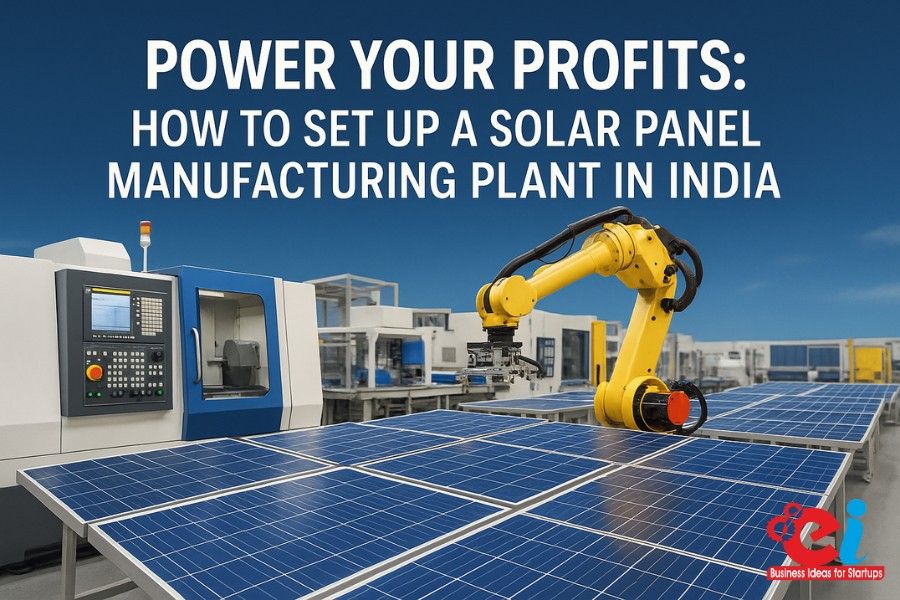Realizing the potent of solar energy is no more a vision but embracing renewable sources of energy like solar in India is something the government is promoting actively. This is promising for the environment. Because of this, starting a business that manufactures solar panels is fast becoming one of the most beneficial ventures for many entrepreneurs in India.If you’re looking to build an environmentally friendly business that ensures optimal returns, then investing in a solar panel manufacturing plant in India is the opportunity you’ve been waiting for.
This guide provides an in-depth understanding of the market, the necessary legal requirements, the equipment of solar panel plant business, financial aspects of the business and how NPCS (Niir Project Consultancy Services) assists you throughout the process.
Table of Contents
Toggle1. What Makes Starting a Solar Panel Manufacturing Company in India Attractive?
1.1 Government Of India’s Initiative
India has set its goals to achieve 500 GW of non-fossil fuel energy capacity by 2030. To help accomplish this goal, the government works on initiatives such as:
- Production Linked Incentive(P.L.I) for High Efficiency Solar PV Modules
- M-SIPS (Modified Special Incentive Package Scheme)
- For faster solar project environmental clearances
1.2 Growing National and International Market Opportunities
The solar energy market in India is expanding at a compounded annual growth rate (CAGR) of over 20% making the country the third largest player in the global solar market. India has also started emerging as an exporter of solar panels to Southeast Asia and Africa.
1.3 Unmet Demand
There’s no domestic solar panel production industry in India which makes it’s almost complete (70-75%) dependency on import presents a timely and scalable opportunity.
2. Kinds of Solar Panels You Can Make
When it comes to setting up and running a plant the first step is to decide what product are you going to sell.
- Monocrystalline Solar Panels
- Polycrystalline Solar Panels
- Thin-Film Solar Panels
- Bifacial Solar Panels
- Flexible Solar Panels
All of them have particular processes that evolve their manufacturing, the type of raw materials needed, and their primary uses, which are also different.
3. An In-Depth Guide to Establishing a Solar Panel Manufacturing Business
Step 1 – Market Research including Feasibility Study Analysis
Involves doing an extensive study including:
- Demand in the targeted market both… domestically and internationally
- Competitor comparison
- Cost breakdown versus competition
- Regulatory environment to evaluate peers and rivals
- Cost structure and pricing outline models

Step 2 – Choose an Optimal Site
The region is favorable in terms of access, economy, and offers the following:
- Access to suppliers of raw materials
- Skill levels of available labor
- Confirmation of industrial zoning
- Availability of transportation modes
- Electricity and water supply
The following are some of the most popular industrial solar panel manufacturing hubs in India:
- Anantapur, Andhra Pradesh
- Dholera, Gujarat
- Bhiwadi, Rajasthan
- Sriperumbudur, Tamil Nadu
Step 3 – Analyze Your Forecasted Production Capacity
The investment put in PLN determines the limit on the production capacity of the plant. This is fixed by the amount of land available as well as the phase/strategy of marketing being employed. These are the standard capacities:
- Small scale: 10 – 30 MW/year
- Medium scale: 50 – 100 MW/year
- Large scale: 250 – 500+ MW/year
It is advisable to begin with a capacity of 30 MW for micro and small enterprises (MSMEs) to ensure optimum return on investment (ROI).
Step 4: Register then Establish Your Company and Get the Necessary Licenses
Check the following registration and approval requirements:
- Registration of a Company (Private Limited, LLP, or Proprietorship)
- Factory License
- PCB Clearance
- GST Registration
- BIS Certification for Solar Modules (IS 14286/61730)
- Fire Safety Clearance
- Import Export Code (IEC) for Exports
Step 5: Strategically Design the Layout Plan for Infrastructure
You will require the following:
- Factory shed (30-100 MW between 20,000 and 40,000 sq. ft.)
- Storage spaces for raw materials and goods finished
- Solar cell lamination clean room
- Head office, laboratories including testing lab
NPCS will assist you with optimal planning and infrastructure design N tailing to the capacity you select.
Step 6: Purchasing of Machinery and Other Equipment
- Solar cell stringing and tabber machine
- Glass washing machine
- EVA cutting machine
- Laminator
- Framing machine
- IV tester
- EL Tester (Electroluminescence)
- Soldering station for the junction box, curing section
NPCS Power Plant Machinery Pricing Examples illustrates that the estimated machinery investment at a 30MW plant is between ₹8 – ₹12 crore.
NPCS project report deliverables comprises a comprehensive list of equipment and suppliers.
Step 7: Source Raw Materials
Some of the primary common raw materials are the folllowing:
- Glass and Solar Cells that can be Domestic and Imported.
- Back Sheet.
- EVA Sheets.
- Aluminum Frame.
- Sealants.
- Junction Box.
You can contact NPCS since they have supplier databases and procurement strategies tailored to your area of interest.
Step 8: Hire, Train, and Mentor
The following manpower requirements are relevant to operations in a 30MW plant.
- 5-10 Technical Personnel.
- 3-5 Quality Control Experts.
- Administrators and Logistics Support.
- 25-40 Semi-Skilled and Skilled Workers.
Training entails cleanroom work, soldering, and module testing.
Step 9: Quality Control and Certifications
In solar panel manufacturing, quality is non-negotiable and the following certifications are compulsory:
BIS certification.
- NRE Empanelment for Goverrnment Tenders.
- ISO 9001 for Quality Management.
- ISO 14001 for Environmental Management.
- CE Certification for Export.
NPCS assists clients in every step of the certification process while ensuring the technical documentation requirements are met.
Step 10: Company Marketing, Branding & Distribution
Make sure your marketing strategy includes the following actions:
- Creating a product brochure and/or catalogue
- Launching a company website or homepage and optimizing it for search engines with the primary keyword “solar panel suppliers in India.”
- Active participation in renewable energy expos
- Establishing B2B partnerships with EPC contractors and rooftop solar integrators.
Additionally, you can promote the products on government portals including the GeM (Government e-Marketplace) as well as IREDA.
4. Expense Type for 30MW Solar Park Investment and Cost Outline
Expense Head:
Estimated Cost (₹ Lakhs)
- Land and Building (leased or owned): Between 150-300
- Machinery and Equipment: 800-1200
- Raw Materials (initial three months): 300-400
- Setting up Human Resources: 50-70
- Creating Brand, Certificate and License: 30-50
- Working capital and contingency funds: 150-250
Total Estimated Investment: 15-22 crores
5. Revenue Forecasts & Profit Breakdown
- Profit Margin: 25% – 35% of the expected turnover ( 65-80 crores ).
- Total Output: Approx 100000 electricity producing solar panels in a year.
- Per unit selling price: 6500-8000
- Break-even point (without losses): 2.5 – 4 years
6. Risk factors and mitigation
Risk
Mitigation Strategy
- Change in regulation laws: Follow updated alerts through the MNRE, BIS, or NPCS newsletters.
- Raw material market volatility: Invest in long-term supplier contracts to control unpredictable expenses.
- Technological advancements: Automated machines should be upgradable to avoid tech obsolescence.
- High competition: Focus on a targeted audience of bifacial or off-grid solar panels.
7. How NPCS Can Help You
NPCS is best known for providing reliable aid on solar project consultancy and feature comprehensive reports on all aspects of the solar panel manufacturing projects, including market feasibility studies and research:
- They design plant layouts tailored to fit their client’s needs.
- Outline the entire production process.
- In-depth list of needed machinery and raw materials.
- Detailed ROI, BEP, and profit calculations.
- Provide licenses and certificates.
- Analyze finances along with annexures.
That’s why NPCS focus on providing clients aid complete with years of experience alongside ready solar and renewable energy solutions.
For requirements related to any decision-making projects, you may reach out to:
NIIR Project Consultancy Services
Send us an Email at info@entrepreneurindia.co
You can check us at www.entrepreneurindia.co and at www.niir.org for more details
Conclusion: The Future is Solar, and the Future is Now
Establishing a solar panel manufacturing plant in India is not only a business opportunity but also a step towards a better tomorrow. The strong support from the Indian government and the increasing global appetite for clean energy presents the perfect opportunity to invest in solar manufacturing. With NPCS as your partner, you can have an efficient and impactful journey.

















